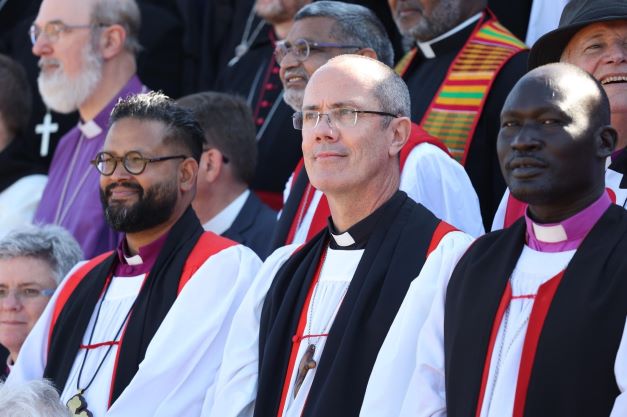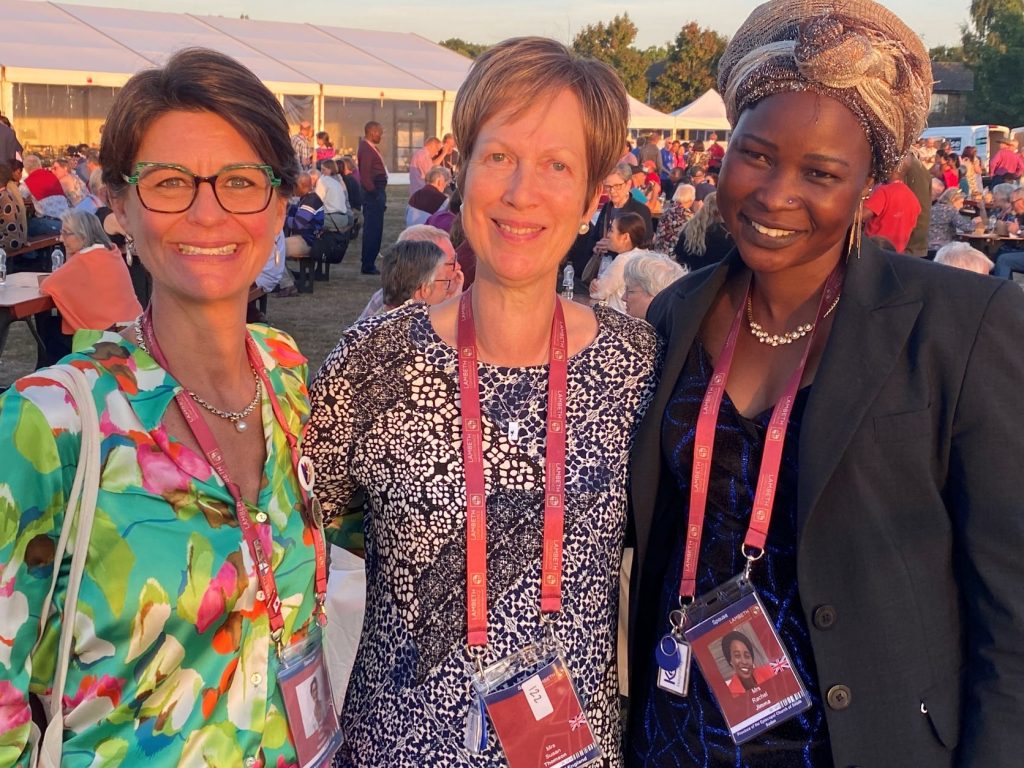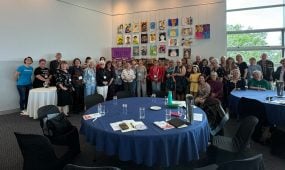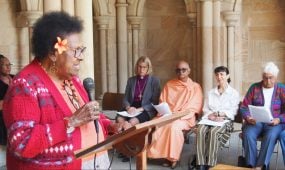650 Bishops, 550 spouses and 10 calls
Reflections
“I left the UK in August with a renewed hope for the future of the Anglican Communion, and for the future of our Diocesan community. Reassuringly, most of the conference’s 10 Calls resonate with existing areas of focus and ministry in our Diocese,” says Bishop Cam Venables

We gathered…
From 27 July to 7 August 2022, 650 Bishops and 550 spouses gathered at the University of Kent in England for the 15th Lambeth Conference. Our theme was “God’s Church for God’s World”.
Different to previous once-in-a-decade Lambeth Conferences, we operated in the following three phases:
- In phase one we developed a sense of walking together before the conference by meeting online in small groups for conversation, study and prayer.
- In phase two we met together in Canterbury for face-to-face listening, discussion and prayer.
- In phase three we plan to work together over the next 10 years to implement and develop specific intentions expressed in 10 documents called “Calls”.
During the 12 days of the Conference we:
- Worshipped together with a Eucharist most mornings and Evening Prayer most afternoons. We prayed together in the conference rooms, at Canterbury Cathedral and at Lambeth Palace. We prayed for each other in small groups and pairs daily. The highly-skilled worship team enabled us to sing in nine languages, and the virtuosity of the musicians was an ongoing joy!
- Studied the Bible together by systematically unpacking the First Letter of Peter. An official conference commentary on 1 Peter was developed by an international group of 35 New Testament scholars from Anglican, and other, churches around the world. The scholars represented a range of Christian traditions and experience, hailing from Australia, Botswana, Brazil, Canada, China, Colombia, Egypt, India, Ireland, Kenya, Nigeria, the Philippines, Singapore, South Africa, Switzerland, the UK and the US. It was good to study online together before the conference. It was good to have Archbishop Justin teaching before further discussion in small groups. And, it was good to be grounded in this study each day.
- Reflected on issues together, with the conference planning group identifying 10 areas that would be unpacked in plenary sessions and by small groups. To prepare for this work, 10 working groups were appointed, each led by an Archbishop, with five other Bishops from around the Anglican Communion, and experts from each field. These working groups prepared papers that gave thorough backgrounds and made specific recommendations called “Calls”. The 10 areas were Mission and Evangelism; Safe Church; Anglican Identity; Reconciliation; Human Dignity; Environment and Sustainable Development; Christian Unity; Interfaith Relations; Discipleship; and, Science and Faith. We read the papers before arriving. The 10 plenaries gave further background, which was then discussed by 84 small groups, with small group leaders documenting the feedback each evening to send back to the relevant working group.
- Lived together as we were all packed into halls of residence, sharing meals in refectories, and washing clothes together in laundries…so, there was much grace each day!
The entire conference was a blessing and I have a number of highlights. I am very grateful that my wife, Kate, and I had the opportunity to participate in the Lambeth Conference together – we both came away energised and encouraged.
There were times when it felt like we were “speed dating” for 10 days because at each activity you introduced yourself to someone and they introduced themself to you and conversations would unfold about family and ministry context…and more! Old friendships were renewed, new friendships were made, and much respect developed for those serving in difficult and dangerous places.
The conference was intellectually stimulating, and I was particularly inspired by the Human Dignity call (in its uncomfortable naming of ongoing colonial legacy), the Environment and Sustainable Development call (drawing upon the work of Kenyan environmental activist Dr Wangari Maathai and the launching of the Communion Forest initiative), and the Science and Faith call (which calls for dialogue, education and research).

Kate Venables, Sue and Rachel Jimma participated in spouse activities while their Bishop husbands joined in the 2022 Lambeth Conference activities
I left the UK in August with a renewed hope for the future of the Anglican Communion, and for the future of our Diocesan community.
Reassuringly, most of the conference’s 10 Calls resonate with existing areas of focus and ministry in our Diocese, including the ACSQ Mission, Vision and Values (the Mission and Evangelism and Anglican Identity calls); child-safe policies and procedures (the Safe Church call); Angligreen, our schools and parishes, Baroona Farm and the Justice Unit (the Environment and Sustainable Development call); Anglicare, the Domestic and Family Violence Working Group, chaplaincies and our Reconciliation Action Plan (the Human Dignity call); and, the Vocations Task Force, AYCF Ichthus camps, St Francis College, Roscoe Library, FormedFaith, anglican focus, schools, parishes and ministries, such as Mothers Union, Mission to Seafarers and GFS – An Anglican Ministry (the Discipleship call).
Advertisement
It would be good to share the relevant papers with each of these groups and initiatives to identify what resonates, what inspires and what may need inclusion! For example, one call that seems to need better addressing is “Science and Faith” and I think it would be initially helpful to share this paper with the Anglican Schools Commission’s Director of Mission, and those who lead our Anglican schools.
A key takeaway of the conference for me was the potential gift of partner church relationships. It seemed that most of the Bishops I met and shared with were in some sort of partner relationship with another Diocese and the recurring refrain was that each participating Diocese found the relationship missionally helpful. Consequently, I think it would be worth exploring the possibility of the ACSQ establishing a partner church relationship with another Diocese, or maybe more than one! Possibilities to consider include Papua New Guinea, Vanuatu, and the Solomon Islands – partly because of geography, and partly because we have growing numbers of seasonal workers from these countries worshipping in our congregations. Another possibility to consider is a Canadian Diocese because of a perceived theological alignment and a shared call to Reconciliation with First Nations peoples.
I was also struck by the gratitude expressed by South Sudanese Bishops. In our Diocesan community, we are blessed with five Dinka-speaking congregations, and one that speaks Arabic. To better work with these congregations, and other multi-cultural congregations, the ACSQ appointed Bishop Daniel Abot early last year to serve as a Resource Church specialist. Inevitably Bishop Daniel’s ministry extends (by phone and online) to other congregations around Australia and word of this has spread through the Episcopal Church of South Sudan and is clearly much appreciated.





